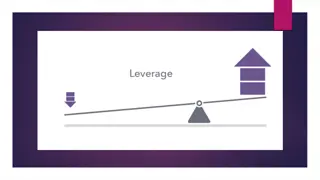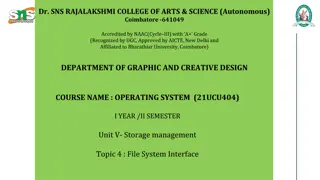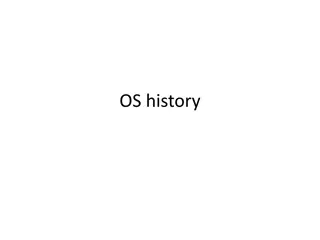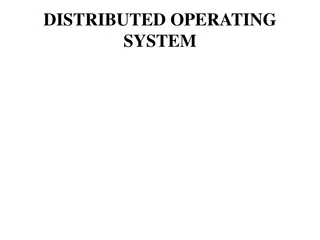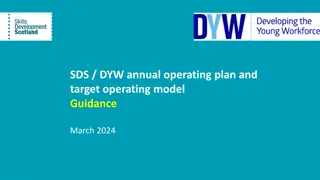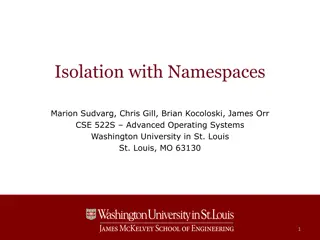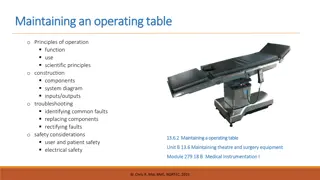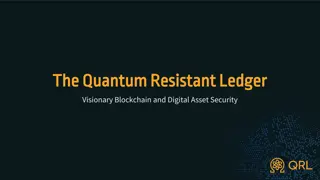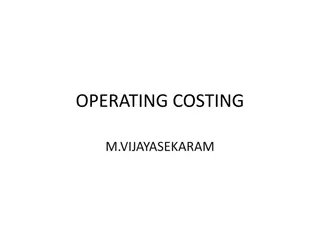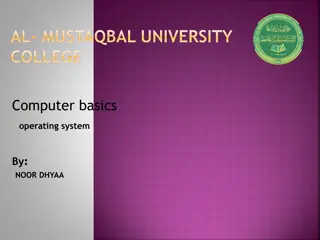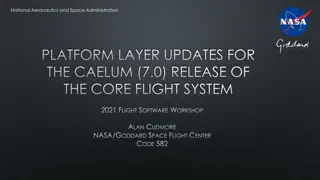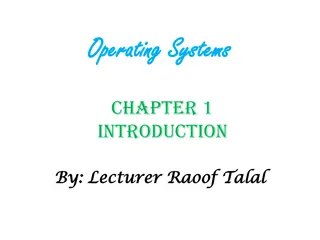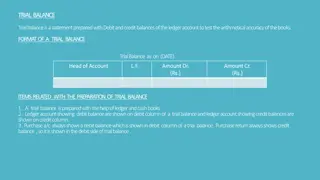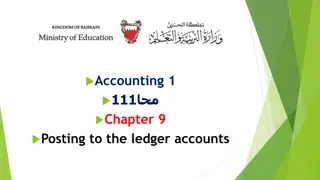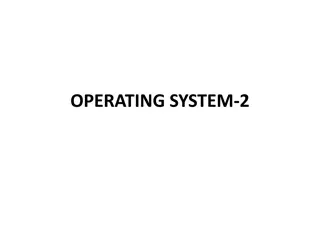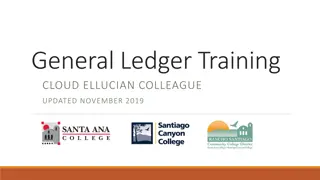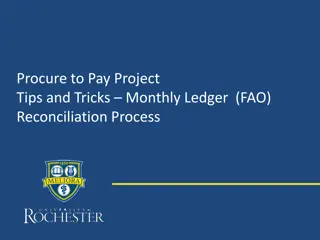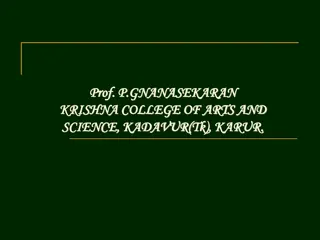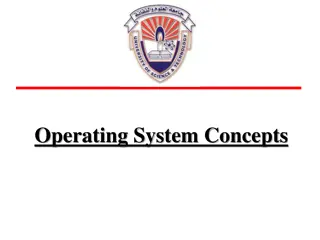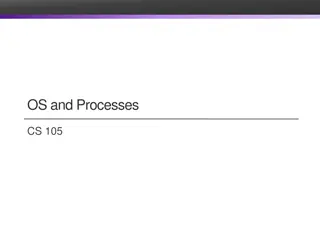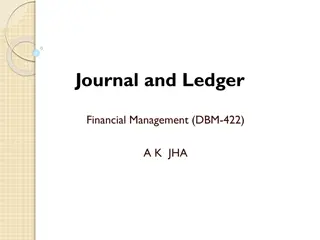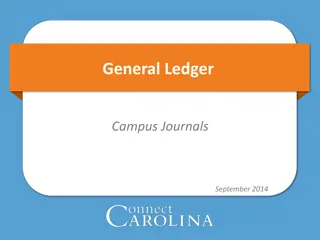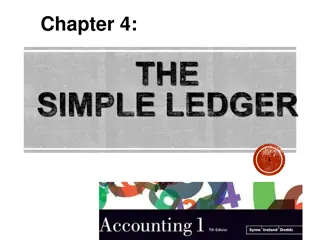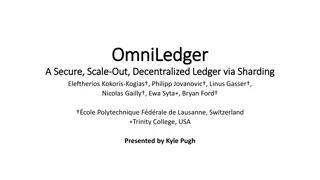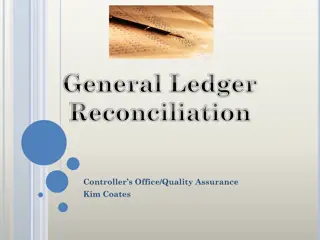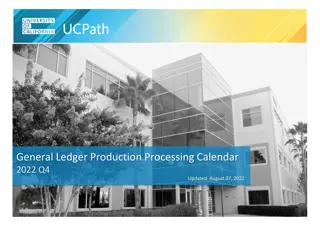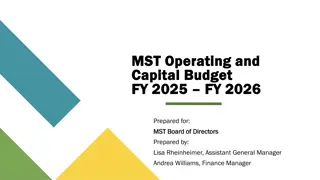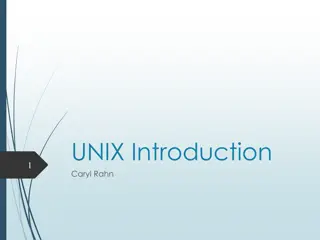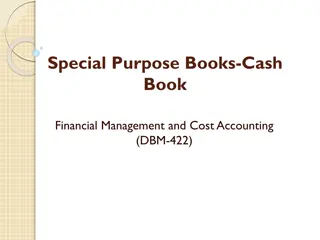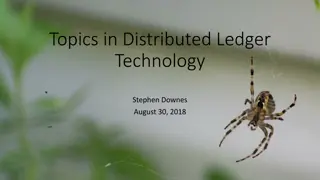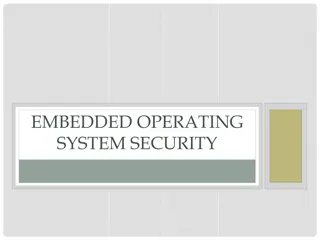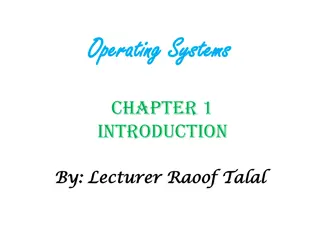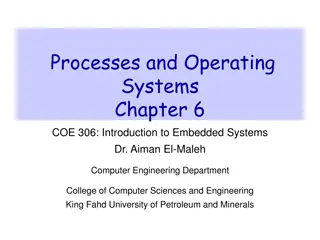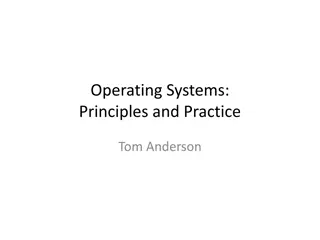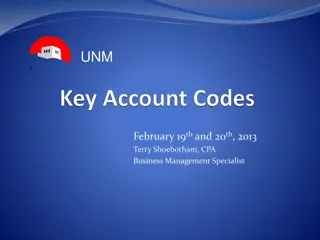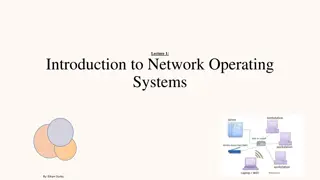Understanding Leverage and Operating Leverage in Financial Management
Leverage in financial management refers to using assets or funds with fixed costs to analyze the impact of debt and equity mix on shareholder returns and risk. Operating leverage focuses on leveraging fixed operating costs to amplify profit changes with sales variations, measured by the degree of op
2 views • 6 slides
Operating Systems
An operating system is a crucial program that manages all other programs on a computer. It handles tasks like input recognition, file management, and device control. There are different types of operating systems such as single-user, single-task systems, multi-user, multi-task systems, real-time ope
6 views • 11 slides
Understanding File System Interface in Operating Systems
The file system interface is a crucial aspect of any operating system, providing users with a method for storage and access to data and programs. It comprises files for data storage and a directory structure for organizing and managing files within the system. File attributes like name, identifier,
0 views • 8 slides
Evolution of Operating Systems: From Mainframe Computers to Unix
Before the 1950s, users interacted directly with mainframe computers without an operating system, debugging using control panels. The transition to writing programs in symbolic languages led to the need for specific drivers. Run queues and operator-assisted job submissions marked this era. The first
0 views • 41 slides
Overview of Distributed Operating Systems
Distributed Operating Systems (DOS) manage computer resources and provide users with convenient interfaces. Unlike centralized systems, DOS runs on multiple independent CPUs and prioritizes software over hardware. It ensures transparency and fault tolerance, with a focus on software error handling.
1 views • 36 slides
SDS/DYW Annual Operating Plan and Target Operating Model Guidance - March 2024
This guidance outlines the development of an Annual Operating Plan and Target Operating Model (TOM) to enhance collaboration and improve outcomes for young people. It emphasizes aligning planning activities, co-designing learner experiences, and maximizing collective resources through strategic part
1 views • 9 slides
Understanding Isolation and Virtualization in Operating Systems
This text delves into the concepts of isolation and virtualization in operating systems. It covers topics such as virtual memory, virtual machines, containers, and kernel isolation mechanisms like chroot and cgroups. The discussion explores how these techniques provide isolation between processes, c
5 views • 20 slides
Maintaining an Operating Table: Principles and Functions
An operating table system comprises three components - the table column, table top, and transporter, each available in different versions for various surgical disciplines. Stationary tables are anchored to the floor, offering flexibility to adapt to patient needs. Mobile tables provide maneuverabili
0 views • 12 slides
Addressing The Quantum Threat: The Quantum Resistant Ledger
The Quantum Resistant Ledger (QRL) is a visionary blockchain and digital asset security solution designed to counter the emerging threat of quantum computing. With quantum technology advancing and traditional blockchains at risk, QRL offers an industrial-grade, quantum computer-resistant cryptocurre
3 views • 9 slides
Understanding Operating Costing in Service Industries
Operating costing is a method utilized by service-oriented businesses to ascertain the costs of providing services. Industries such as transportation services, welfare services, utility suppliers, and municipal services find operating costing beneficial. The method involves classifying costs into th
1 views • 6 slides
Understanding Operating Systems: Basics and Types
An operating system is essential software that manages a computer's hardware and software, allowing users to interact with the computer. Learn about the functions of an operating system, its importance, types available such as Microsoft Windows and macOS, and how they impact different devices. Disco
1 views • 11 slides
NASA Platform Layer Updates for the CAELUM (7.0) Release
The National Aeronautics and Space Administration (NASA) discusses platform layer updates for the CAELUM (7.0) release of the Core Flight System in the 2021 Flight Software Workshop. The platform layer consists of the Operating System Abstraction Layer (OSAL) and Platform Support Package (PSP), whic
1 views • 20 slides
Understanding Operating Systems: Introduction and Functions
An operating system plays a crucial role in managing computer hardware and facilitating user-computer interactions. It serves as an intermediary between users and hardware components, ensuring efficient resource allocation and control. The operating system coordinates the use of hardware resources b
5 views • 16 slides
Understanding Trial Balance and Trading Account Preparation
Trial balance is a statement that tests the accuracy of ledger account balances, with debit balances displayed in the debit column and credit balances in the credit column. The preparation involves using ledger and cash books, with specific rules for different accounts such as purchases, sales, open
0 views • 6 slides
Understanding Ledger Accounts and Posting Transactions in Accounting
This content discusses the importance of ledger accounts and the process of posting journal entries to the ledger in accounting. It explains the general ledger, double-entry system, essential points to consider, and provides illustrations of posting transactions in various accounts like cash, suppli
2 views • 23 slides
Evolution of Operating Systems: A Historical Journey
Explore the fascinating evolution of operating systems from the late 1950s to the 1970s, including key milestones such as the development of Unix, DOS, and Windows. Discover how operating systems have progressed to support multi-tasking and multi-user capabilities, dynamic address translation, and m
0 views • 89 slides
Understanding Ellucian Colleague General Ledger Training
This document provides detailed information on Ellucian Colleague's general ledger training, including the accounting system, chart of accounts, common acronyms, and functionalities for managing budgets and expenditure reports. Learn about the structure of the Chart of Accounts, fund classifications
7 views • 46 slides
Tips and Tricks for FAO Ledger Reconciliation Process
Discover valuable insights and strategies for reconciling your FAO ledger efficiently. Learn how to review transactions, verify budgets, and generate essential reports for accurate financial management. Ensure compliance and accuracy in your procure-to-pay project cycle.
0 views • 9 slides
Understanding Operating Systems: Functions and Evolution
Operating systems are essential software that enable computers to function effectively by managing hardware resources and facilitating communication between applications and hardware. This article covers the basics of operating systems, their structure, evolution, functions, and types. It also explo
2 views • 23 slides
Understanding Operating System Concepts: Lecture Overview and Services
Exploring the lecture content on operating system concepts, structures, services, system calls, and file manipulation. Delve into the importance of operating system services, error detection, program execution, I/O operations, protection, security, and resource allocation in operating systems. Learn
5 views • 26 slides
Enhancing IoT Systems with Blockchain and Distributed Ledger Technologies
Explore the potential of blockchain and distributed ledger technologies in enhancing IoT systems, focusing on privacy, security, and safety. The workshop discusses the benefits and challenges of implementing DLT, as well as a reference IoT scenario in the manufacturing industry. Discover how DLT ena
0 views • 16 slides
Introduction to Operating Systems and Processes
In this informative content, we delve into the fundamental concepts of operating systems (OS) and processes. Operating systems are essential software that manage a computer's resources for users and applications. We explore the core functionalities of an OS, such as resource allocation, isolation, c
0 views • 41 slides
Understanding Journal and Ledger in Financial Management
Explore the significance of the Journal and Ledger in financial management. Learn how transactions are recorded in chronological order, and understand the characteristics and steps involved in journalizing. Discover the different types of accounts like Personal and Real accounts that are essential f
0 views • 25 slides
Campus Journals and General Ledger Overview
Campus Journals in September 2014 cover various topics such as Icebreaker activities, Ground Rules, Safety procedures, Disclaimers, Class Format, Agenda for the session, Campus Journal types, and Transaction Types. The content includes descriptions of different journal types and transaction types, a
0 views • 43 slides
Understanding Ledger Accounts and Financial Position
Ledger accounts play a crucial role in recording individual item changes affecting financial position. Each balance sheet item has its own account, ensuring accurate financial tracking. The accounting equation dictates where assets, liabilities, and owner's equity are located on the balance sheet, w
0 views • 64 slides
OmniLedger: Decentralized Ledger with Sharding
OmniLedger is a decentralized ledger using sharding to enhance scalability without compromising security. It addresses challenges such as validator selection, cross-shard transactions, and checkpointing. The proposed solution includes ByzCoinX for consensus and Atomix for atomic commit. Goals includ
0 views • 13 slides
Ledger Reconciliation Best Practices and Guidelines
Guidelines for effective ledger reconciliation, including verification of transactions, use of source documents, and completion of necessary certifications to ensure accuracy and compliance.
0 views • 31 slides
UCPath General Ledger Processing Calendar Q4 2022
This document provides the UCPath General Ledger Processing Calendar for the fourth quarter of 2022, including important dates and activities such as on-cycle and off-cycle confirmations, local approval deadlines, batch runs, and holidays. It covers the months of October, November, and December with
0 views • 5 slides
MST Operating and Capital Budget FY 2025 Summary
The MST Operating and Capital Budget for FY 2025 focuses on maximizing revenues, increasing bus advertising rates, promoting transit services, seeking grants for capital projects, and maintaining stable staffing levels. The budget priorities also include operating a Better Bus Network at Board-adopt
0 views • 10 slides
Understanding UNIX Operating System
UNIX is a versatile operating system that enables multi-user access, multitasking, and portability across various computing environments. It serves as the foundation for many modern operating systems and has influenced concepts incorporated in Microsoft Windows and DOS. The UNIX system comprises dis
0 views • 51 slides
Introduction to Subsidiary Books in Accounting
Business transactions are initially recorded in a Journal and then transferred to a Ledger for better organization. Subsidiary Books, such as Cash Book, Purchase Book, and Sales Book, help in recording specific types of transactions efficiently. These specialized books assist in preparing Ledger acc
0 views • 12 slides
Understanding Distributed Ledger Technology Concepts
Distributed Ledger Technology (DLT) involves core concepts like assets, ledgers, transactions, states, conditions, and inferences. It also includes distributed ledgers, cryptographic hash functions, construction of a blockchain, consensus mechanisms like proof of work, and examples of applications s
0 views • 27 slides
Introduction to Linux: Course Overview and Objectives
This introduction to Linux course provides a comprehensive overview of operating systems, including the history, variations, user interface, and essential commands. The course is designed with lectures, labs, and exercises to help participants gain a better understanding of Linux and its practical a
1 views • 77 slides
Understanding Embedded Operating System Security
Embedded operating systems are designed for special purposes with limited resources and small sizes, found in various devices like ATMs, smartphones, cars, and more. Common operating systems include VxWorks, Windows, QNX, and SCADA, with different applications and requirements. Windows CE stands out
0 views • 21 slides
Understanding Operating Systems: An Introduction and Overview
An operating system is a crucial program that manages computer hardware and serves as an intermediary between users and hardware. This chapter explores the role of operating systems in a computer system, covering components like hardware, application programs, and users. It delves into how operating
0 views • 16 slides
Introduction to Processes and Operating Systems in Embedded Systems
Processes and operating systems play a crucial role in building complex applications on microprocessors, offering flexibility to meet timing requirements. The operating system (OS) manages processes by providing mechanisms for switching execution between them. Real-Time Operating Systems (RTOS) are
0 views • 65 slides
Understanding Operating Systems: Principles and Practice in CSE Curriculum
Dive into the world of operating systems through the lens of "Operating Systems: Principles and Practice" by Tom Anderson. Discover how this course fits in the UW CSE curriculum, covering systems programming, operating system interfaces, and distributed systems. Explore the project work on building
0 views • 21 slides
Understanding Account Codes for Business Management Specialists
This content covers the basics of account codes, including types of expenses, selecting account codes for documents, allowable expenses, and more. It delves into operating ledger categories, computer account codes, and the selection process for different expenses, providing valuable insights for fin
0 views • 18 slides
An Overview of Network Operating Systems and Multitasking
This informative content discusses the services of network operating systems, multitasking concepts, essential components, client and server software elements, and network services. It explains the two forms of multitasking - preemptive and nonpreemptive - and their functions within operating system
0 views • 48 slides
Overview of Network Operating Systems and Their Features
Network operating systems are essential software that manage computer resources and provide services for programs. This lecture covers the types of computers in a network, features of operating systems such as process and memory management, disk and file systems, and networking capabilities. Underst
1 views • 27 slides
